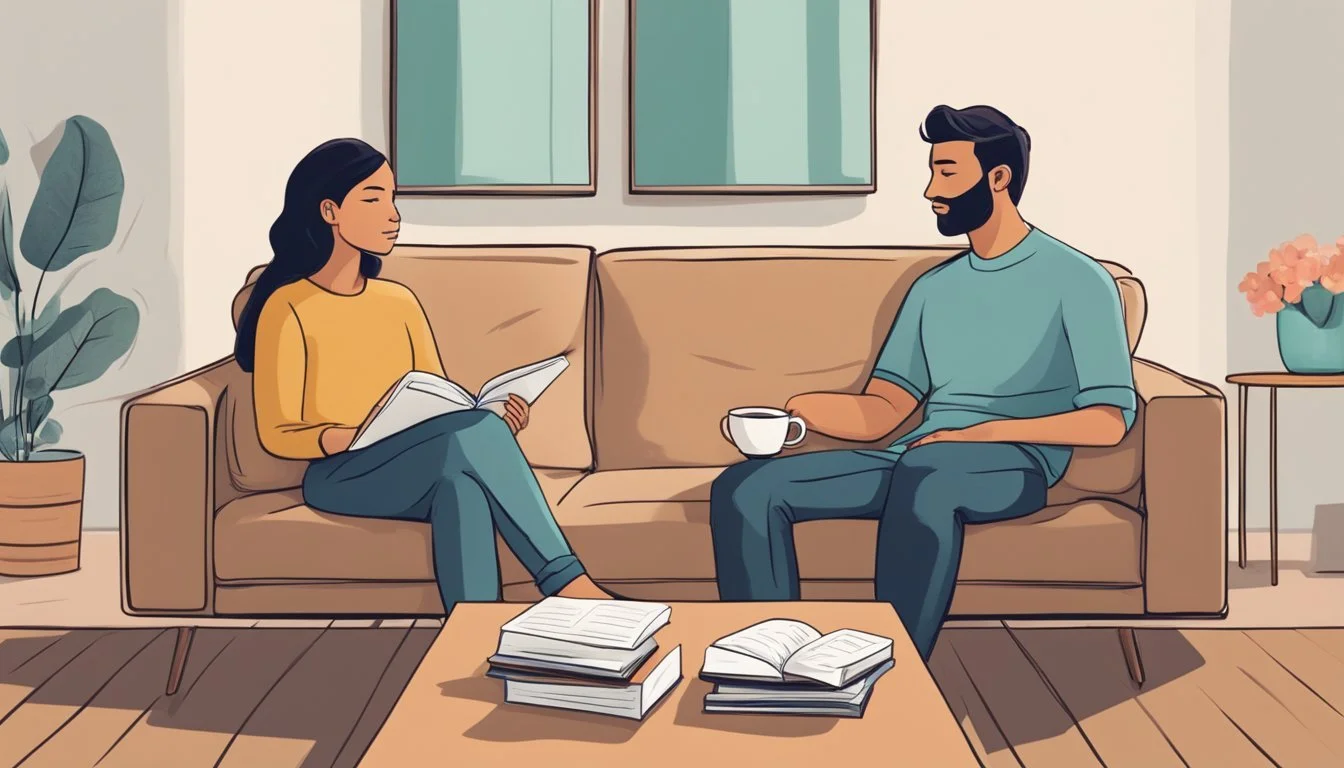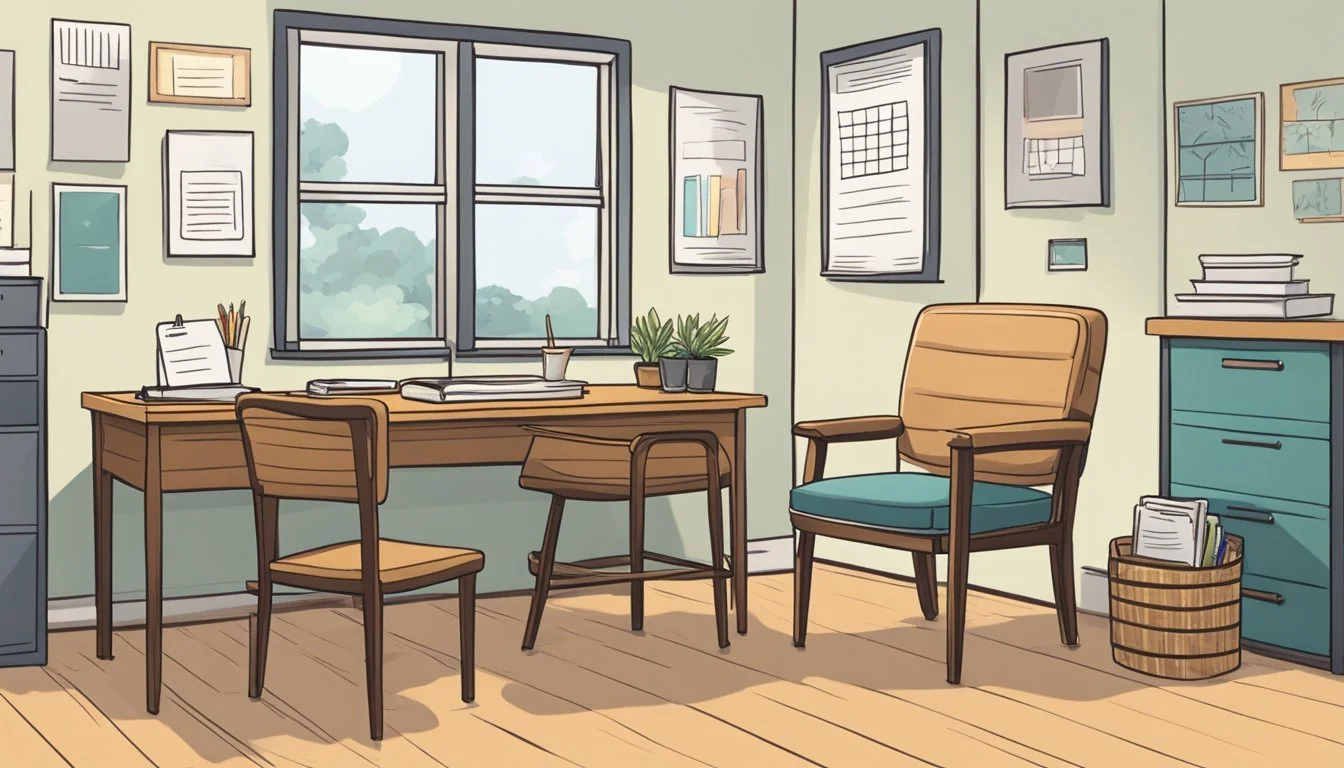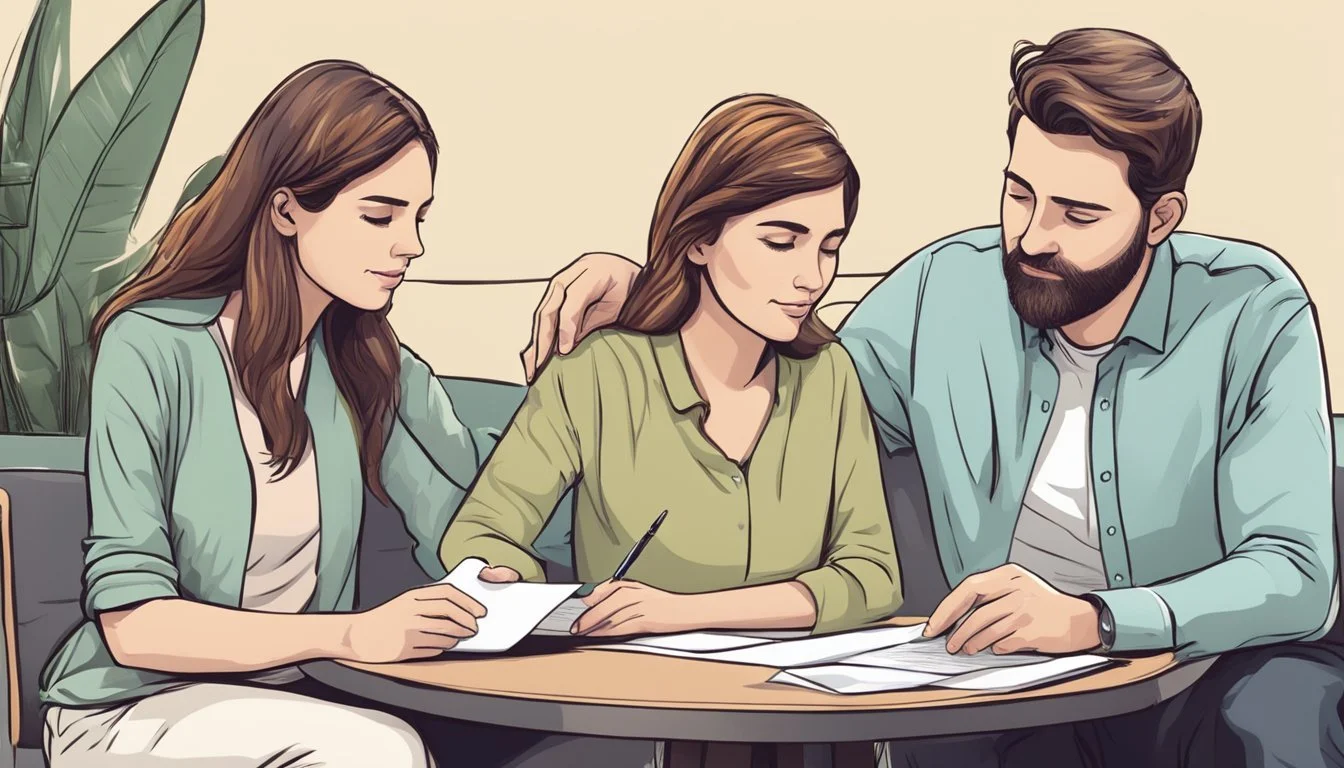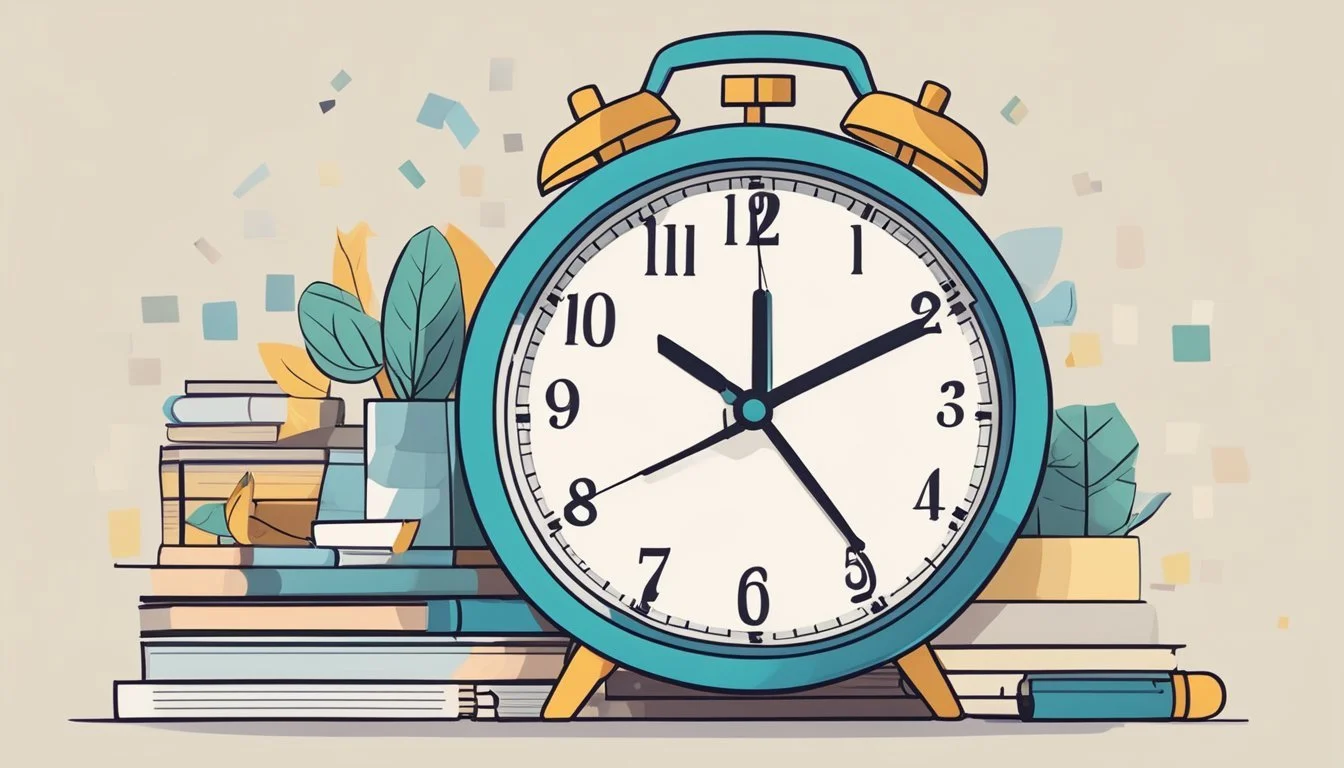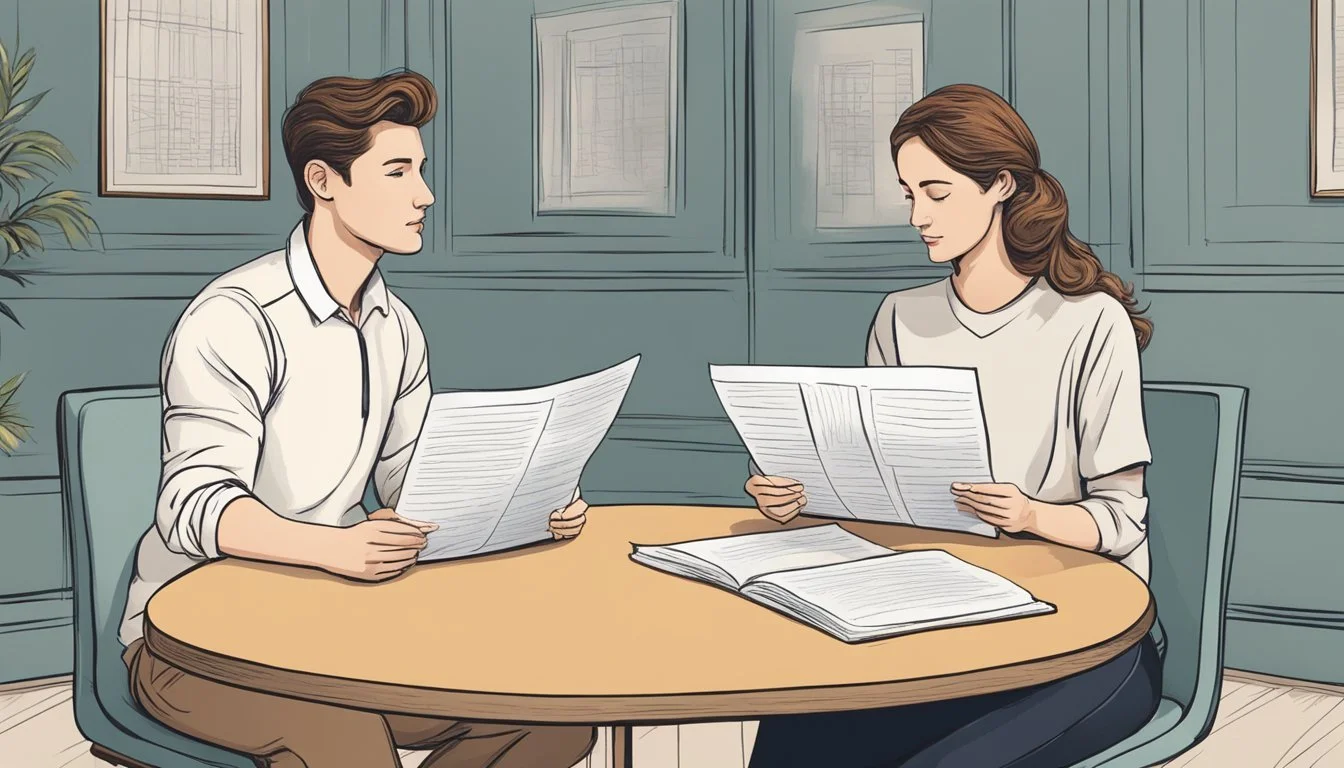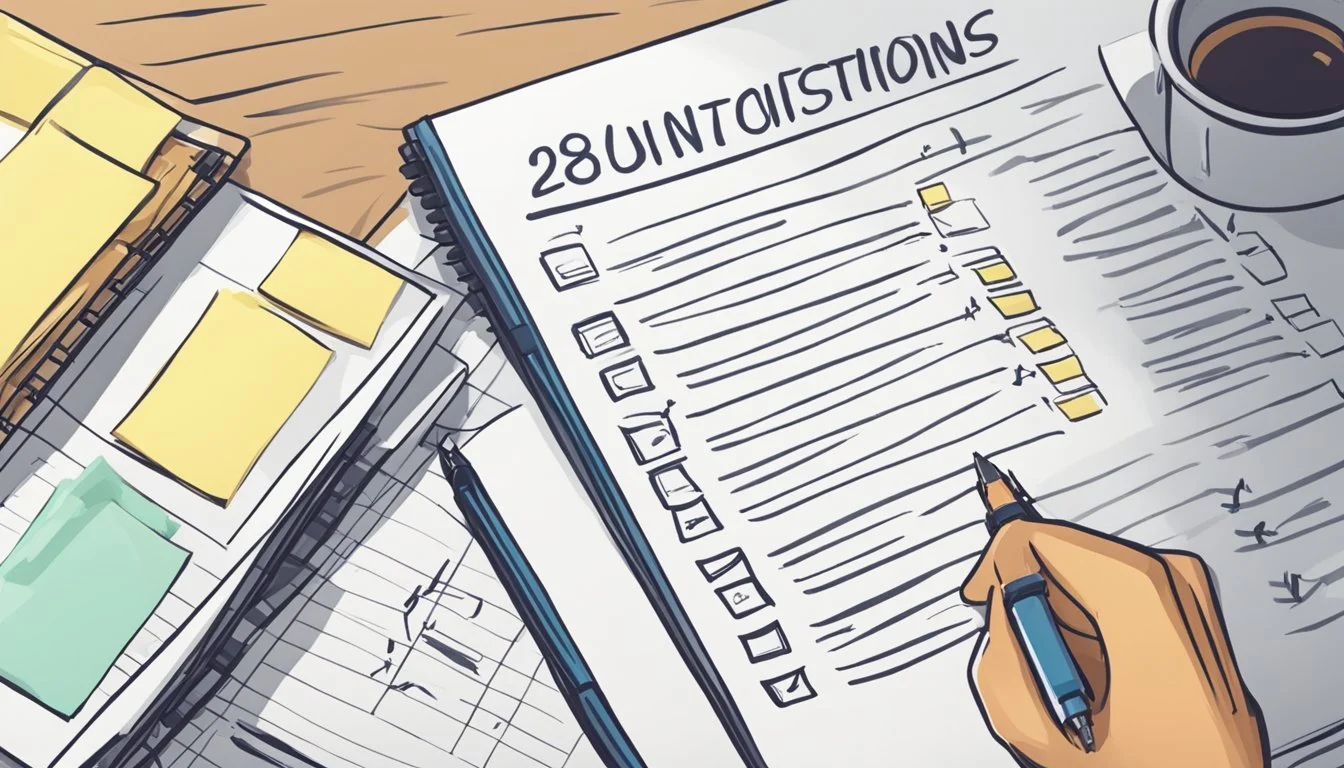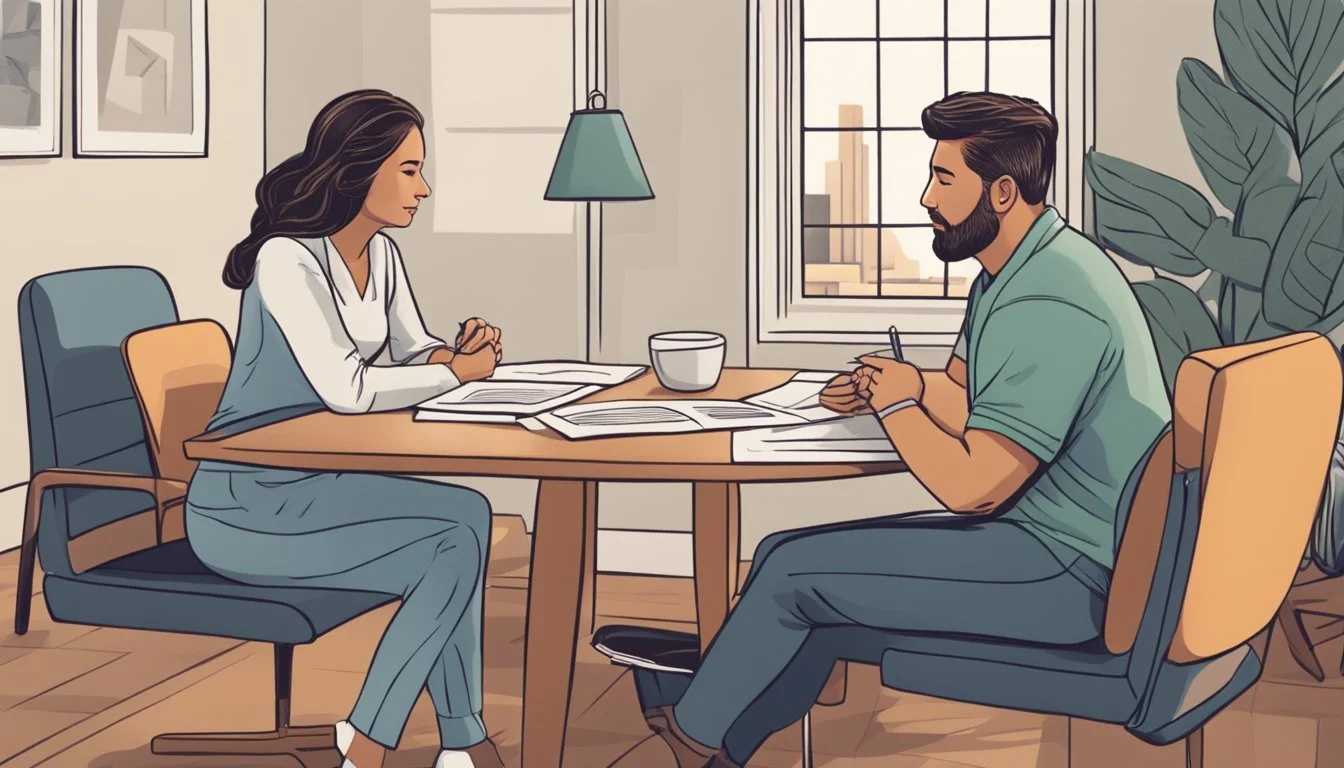18 Questions to Ask Before Considering Couples Therapy
Essential Pre-Therapy Insights
Couples therapy can be a pivotal step for many relationships, offering a structured environment to address various issues. Before diving into therapy, it's essential to ask the right questions to gauge the readiness and commitment of both partners.
Asking key questions can help couples understand their motivations and expectations for therapy. This pre-therapy assessment can lay a foundation for more productive and focused sessions, ultimately leading to stronger, more resilient relationships.
1) What are our main reasons for considering therapy?
Couples often seek therapy to address specific issues within their relationship. It's important to identify these main reasons before starting therapy to ensure that both partners are on the same page.
Some common reasons include communication problems, unresolved conflicts, or a desire to rebuild trust. Sometimes, couples face significant life changes that create stress and misunderstandings.
Understanding the root cause of wanting therapy can guide the sessions effectively. Whether it’s dealing with infidelity, differing parenting styles, or emotional distance, identifying the main reasons helps in setting clear and attainable goals.
In some cases, one partner might feel more strongly about therapy than the other. Openly discussing why therapy is being considered can help in finding common grounds and mutual understanding.
2) Do we both agree on the need for therapy?
Before starting couples therapy, it is essential that both partners agree on the need for it. Mutual consent signifies a shared responsibility in addressing relationship issues and fosters an environment of cooperation.
When one partner is hesitant, it can hinder the progress made during sessions.
Each person should express their thoughts about therapy openly. If one partner feels compelled to attend rather than inherently wanting to resolve issues, it might affect the therapy's effectiveness.
Having an open conversation about the reasons for seeking therapy can clarify each partner's expectations. This transparency ensures that both are on the same page regarding the goals they want to achieve.
Agreeing on the need for therapy also means acknowledging underlying issues that need addressing. It demonstrates a commitment to working through challenges together.
A united front in seeking help can strengthen the therapeutic process, enhancing the chances of a successful outcome. If either partner feels reluctant, discussing these concerns is paramount to avoid friction during therapy.
In summary, mutual agreement on the need for therapy sets a solid foundation for meaningful and productive sessions.
3) What are our individual goals for therapy?
Understanding personal reasons for seeking therapy is crucial. Each partner should identify what they hope to achieve. Clear individual goals can guide the therapy process effectively.
For some, the goal might be improving communication skills. Others might seek to rebuild trust after a breach. Addressing these goals early on can help tailor the sessions to meet specific needs.
It's also important to acknowledge any apprehensions or concerns about therapy. Voicing these can provide insight into potential barriers to progress and help the therapist address them proactively.
With individual goals clarified, both partners can work towards mutual understanding. This understanding can form a solid foundation for addressing broader relationship issues.
Finally, discussing goals openly can foster a sense of accountability. Partners can support each other in working towards their respective objectives, enriching the therapy experience overall.
4) Have we tried resolving our issues without therapy?
Before seeking couples therapy, consider the approaches you've taken to solve your problems independently. Open and honest communication is vital. Have both parties expressed their concerns and feelings clearly?
Consider whether you’ve set aside dedicated time to address these issues. Sometimes, life's distractions can prevent deep, meaningful conversations.
Think about the tools and methods you've used in your attempts to resolve conflicts. Have you tried reading books on relationships or attending workshops? These resources can provide valuable insights.
Reflect on your willingness to compromise. Are both partners making genuine efforts to find middle ground? Compromise is essential in resolving disputes without outside help.
Assess if you've sought advice from trusted friends or family. An outside perspective can sometimes offer new solutions.
In addition to talking, consider actions. Have both parties shown through behavior that they're committed to resolving issues? Actions often speak louder than words. Talking alone may not be enough.
Evaluate whether personal stressors might be affecting your relationship. Problems at work or personal issues can sometimes spill over into your relationship. Addressing these can improve the dynamic.
Determine if the core problem is identified. Without pinpointing the root cause, any attempt at resolution may be superficial. Knowing the precise issue is critical.
5) Are we committed to making changes?
Commitment to change is crucial for couples considering therapy. Without a mutual desire to improve behaviors and dynamics, progress can be limited.
Both partners must recognize and accept their roles in the relationship's challenges. This means being willing to accept feedback and make necessary adjustments.
Open-mindedness is necessary for effective couples therapy. Each party needs to be ready to explore new strategies and communication techniques.
Acknowledging past mistakes and seeking to understand each other's perspectives can lead to meaningful improvement.
The willingness to consistently apply new skills learned in therapy is essential. This shows dedication to long-term growth and improvement. For more insights, review the questions to consider before your first therapy session.
Discussing readiness for change beforehand helps set realistic expectations. Couples who approach therapy with a proactive mindset are more likely to see positive outcomes.
6) Do we have the time and resources for regular sessions?
Before starting couples therapy, it's essential to consider the time commitment involved. Therapy sessions typically occur weekly or bi-weekly. Each session lasts around 50 minutes to an hour.
Assess if your schedules allow for consistent and uninterrupted participation.
Next, evaluate the financial aspect. Therapy costs can vary significantly depending on the therapist's experience and location. Check whether your insurance covers therapy expenses or if you need to pay out-of-pocket.
Consider also the additional time required for travel to and from the therapist's office.
Online therapy might be a convenient alternative for those with tight schedules or limited mobility. Research various options and determine what works best for you both.
Additionally, factor in emotional resources. Effective therapy requires both partners to be mentally and emotionally prepared to engage in the process.
Regular sessions demand dedication and effort from both individuals involved.
Ensuring both logistical and emotional readiness will set a solid foundation for successful therapy.
Are we prepared to be open and honest in sessions?
Being open and honest in couples therapy is essential for progress. This means sharing thoughts and feelings that may be uncomfortable or difficult to express. Both partners need to feel ready to discuss their emotions without holding back.
Therapy requires a willingness to be vulnerable. If either partner is not ready to share openly, therapy might not be as effective. It's important to prepare for sessions by acknowledging this need for transparency.
Honesty in therapy involves discussing not just the good, but also the bad and the ugly aspects of the relationship. Ignoring or glossing over issues can hinder the therapeutic process.
Additionally, therapists often emphasize that openness helps build trust and strengthen the therapeutic alliance. This can lead to better outcomes and more meaningful conversations.
If unsure about how to start, it may help to write down thoughts or concerns beforehand. Bringing these notes to the session can serve as a guide for honest discussion.
8) What kind of therapy do we think would work best for us?
Choosing the right type of therapy depends on your unique situation and preferences. Some couples benefit from Cognitive-Behavioral Therapy (CBT), which focuses on identifying and changing negative thought patterns and behaviors.
For those dealing with serious relationship conflicts, Emotionally Focused Therapy (EFT) may help. EFT works by addressing emotional responses and improving emotional bonds between partners.
If your issues are rooted in childhood experiences or unconscious beliefs, Psychodynamic Therapy might be useful. Psychodynamic therapy examines how past experiences influence current relationship dynamics.
Couples seeking a structured approach might find success with Behavioral Couples Therapy. This method focuses on problem-solving techniques and setting goals to improve relationship satisfaction.
Interpersonal challenges, such as difficulty starting or sustaining relationships, can be addressed through Interpersonal Therapy. This short-term therapy is empirically validated and deals with social functioning and interpersonal relationships.
Each therapy type offers different approaches and tools. It's essential to discuss with your partner which method aligns best with your needs and comfort levels. Consulting with a professional can also provide guidance on the best therapy for your relationship.
9) Do we have specific issues we need to address?
Identifying specific issues is crucial for effective couples therapy. It helps in setting clear goals and ensures that both partners are on the same page.
Common issues include communication breakdowns, financial disagreements, and differing expectations. Addressing these helps create a roadmap for the therapy process.
Some couples struggle with intimacy problems or trust issues. These specific concerns need focused discussions during sessions.
For others, conflicts regarding parenting styles or household responsibilities may be the primary issues. Acknowledging these areas helps in prioritizing what needs attention first.
Considering what each partner views as significant problems can reveal differences in perception. This can provide a comprehensive view of the relationship's landscape.
Discussing these issues openly can lead to more productive sessions and a clearer understanding of each partner's needs and concerns. If either partner is unsure, writing down concerns before sessions might help.
Understanding specific issues also enables the therapist to tailor their approach effectively. It enables more targeted interventions that can yield better outcomes.
10) How will we measure the success of therapy?
Determining the success of couples therapy can be approached through various methods. One important aspect is setting objective goals. These goals should be specific and measurable, such as improving communication skills or reducing the frequency of arguments.
Tracking progress through regular self-assessments can be effective. Couples can use targeted questionnaires to reflect on their relationship and any improvements they've noticed over time. This helps in objectively measuring changes and ensuring that therapy is on the right track.
Feedback from therapy sessions can also be crucial. Discussing progress directly with the therapist offers an opportunity to evaluate how both partners are feeling about the sessions and whether the therapy strategies are effective.
Additionally, keeping a journal of day-to-day interactions and feelings can offer insight. Couples can review these entries to identify patterns of growth or persistent issues that need further attention.
Another way to measure success is by observing changes in everyday life. Noticing tangible improvements, such as better conflict resolution or increased emotional intimacy, indicates positive movement.
Lastly, periodic reflections between sessions can help reinforce progress. Partners can discuss any positive developments and challenges faced since the last session, providing a realistic view of how therapy is helping.
Measuring the success of therapy involves a combination of these methods to provide a comprehensive view of a couple’s progress.
11) Are we willing to explore our childhood and past experiences?
Exploring childhood and past experiences can be crucial in couples therapy. Many issues in relationships stem from early life events that shape one's behavior, communication styles, and emotional reactions.
Understanding these roots can help partners empathize with each other. It provides a clearer picture of why certain patterns emerge in their relationship.
For instance, unresolved childhood trauma might lead to trust issues or communication breakdowns. Delving into these areas can aid in fostering emotional healing and better understanding between partners.
It's essential for both individuals to be open to this exploration. This requires a willingness to face potentially painful memories and share them honestly with their partner.
Tools like childhood memory prompts and reflective questions can support this process. These can help individuals recall and articulate their past experiences effectively.
Couples therapy often uses these techniques to uncover underlying issues. Addressing these can lead to significant improvements in relationship dynamics.
If both partners are ready to explore their pasts, therapy can become a transformative experience. Transparency about one’s history can strengthen bonds and create a deeper understanding between partners.
12) How will we handle any potential conflicts during therapy?
Couples therapy can bring up various emotions, sometimes leading to conflicts. Discussing beforehand how to manage these conflicts is crucial.
Setting ground rules for respectful communication helps create a safe environment. Agree to avoid yelling or name-calling during sessions. This establishes a foundation for productive dialogue.
Another approach is to take timeouts. If a conflict becomes too intense, a short break allows both parties to cool down and collect their thoughts.
Therapists often guide the conflict resolution process. They use techniques like Emotionally Focused Therapy (EFT) or the Gottman Method to help couples navigate disagreements constructively.
Additionally, partners should agree to revisit unresolved conflicts outside of therapy if needed. This ensures that issues get addressed without derailing the session.
By setting clear expectations and using structured techniques, couples can manage conflicts more effectively during therapy.
13) What are our expectations for the therapist?
Couples must clarify what they expect from a therapist. Do they seek someone who provides direct advice or rather someone who listens and facilitates their communication?
They should consider whether they want a therapist with specific expertise, such as in communication issues or trust rebuilding. Another aspect is the therapist’s approach—should it be solution-focused or process-oriented?
Both partners need to agree on the role of the therapist. Do they want sessions that are structured or more flexible? They should also think about the level of involvement they anticipate from the therapist in their discussions.
It's critical to ensure that their expectations align with the therapist’s methodology. This reduces misunderstandings and helps in finding the right fit for their needs.
Finally, they should determine if they prefer a therapist who challenges them directly or someone who provides more gentle guidance. This will influence how comfortable and effective the therapy sessions will be. For more about different types of questions to consider, visit couples therapy questions.
14) Do we want a therapist with a specific background or approach?
Couples should consider what type of therapeutic approach they think will best suit their needs. Some might prefer a therapist who uses cognitive-behavioral techniques, which focus on changing negative thought patterns. Others might lean toward emotionally focused therapy, which aims to improve the emotional bond between partners.
It’s also important to think about the therapist’s background. Some couples may feel more comfortable with a therapist who shares or understands their cultural or religious background. This can be especially helpful in addressing issues that are specific to certain communities.
Experience with specific issues is another factor to consider. For example, if infidelity is a concern, it might be beneficial to find a therapist who has extensive experience and a proven track record in dealing with such matters.
Additionally, couples may want to explore whether the therapist has additional certifications or specializations. For instance, some therapists are certified in sex therapy, which could be beneficial if sexual intimacy is a primary concern.
Finding a therapist whose background and approach align with the couple's specific needs and values can greatly enhance the efficacy of the therapy sessions. This thoughtful consideration can help ensure a more tailored and supportive therapeutic experience. For more insights on therapist qualifications, visit this guide on interviewing a prospective therapist.
15) Are we open to the methods therapists might use?
Couples therapy encompasses various methods and techniques. Some common approaches include cognitive-behavioral therapy (CBT), emotionally focused therapy (EFT), and the Gottman Method.
Therapists may use different interventions, such as role-playing, communication exercises, and exploring family history. Each method aims to address specific issues and dynamics within the relationship.
Being open to these methods requires trust in the therapist's expertise. Resistance to certain strategies might hinder progress. Understanding the rationale behind each technique can alleviate concerns.
Flexibility in trying new approaches can enhance the therapy experience. Willingness to engage with different methods may lead to discovering what works best for the couple. This open-mindedness is crucial for successful outcomes.
Clear communication with the therapist about any discomfort with specific techniques is important. Therapists are trained to adapt their methods to better suit the clients' needs.
16) How will we stay motivated through the process?
Maintaining motivation in couples therapy is crucial. Setting clear goals can provide a sense of direction and purpose. By defining what they want to achieve, couples can measure their progress and celebrate small wins.
Staying curious about each other's needs and emotions can also keep motivation high. This involves actively listening and showing genuine interest in the partner's perspectives and experiences.
Rewarding each other for progress, both small and large, helps to reinforce positive behavior. This could include verbal affirmations or small tokens of appreciation.
Keeping a "done" list might help too. Instead of just listing what needs to be done, noting completed tasks can serve as a tangible reminder of how far they've come.
Practicing gratitude, especially towards each other, can create a positive atmosphere. Recognizing and appreciating each other's efforts fosters a supportive environment.
Additionally, embracing challenges and viewing them as opportunities for growth can make the therapy process more engaging. Seeing difficulties as stepping stones rather than obstacles can shift their mindset.
Building trust with the therapist is essential. A warm, welcoming atmosphere can encourage open communication, making the process more effective and easier to commit to.
17) What would cause us to stop therapy?
Stopping therapy may be considered when couples feel they have achieved their goals for therapy. Once conflicts are manageable through the skills learned, therapy might no longer be necessary.
Another reason to stop therapy is if one or both partners do not feel committed to the process. Therapy requires effort and willingness from both parties.
Sometimes, a couple might decide to stop therapy if they find it isn't helping their relationship. Alternative methods or different therapists might be explored if progress stalls.
External factors such as financial constraints or scheduling conflicts can also lead to ending therapy. In such cases, seeking flexible or more affordable options might be beneficial.
If the relationship becomes unsafe due to abuse, immediate cessation of therapy and seeking safety is crucial. Professional guidance on handling such situations should be sought.
Changes in status, like deciding to separate or divorce, can affect the need for continued therapy. Couples might shift focus to individual therapy to address personal well-being during transitions.
18) How will we manage therapy costs?
Managing therapy costs is essential before starting couples therapy. It's important to first understand the fee structure of the therapist. Some therapists charge by the session, while others might have packages or sliding scale fees based on income.
Consider checking if your health insurance covers couples therapy. Many insurance plans include mental health benefits that could reduce out-of-pocket expenses. Be sure to verify what is covered and the limitations.
Budgeting for therapy sessions is another key step. Allocate a portion of your monthly budget specifically for therapy. This helps ensure that you can continue attending sessions without financial strain.
Look into community resources that offer affordable or even free couples therapy. Non-profit organizations, university clinics, and community centers often provide these services at reduced rates.
Discuss payment options directly with your therapist. Some might be flexible with payment plans, allowing you to spread the cost over time.
Finally, evaluate the long-term benefits versus the costs. Investing in your relationship through therapy can lead to improved communication and a stronger bond, which may be well worth the expense.
By carefully planning and exploring all available options, couples can manage therapy costs effectively and focus on their relationship.
Understanding Couples Therapy
Couples therapy is a structured approach to resolving relationship issues. It uses various methods, including communication-enhancement techniques and conflict resolution strategies, to strengthen bonds and improve mutual understanding.
What is Couples Therapy?
Couples therapy focuses on improving relationships between partners in a systematic way. It often involves both partners attending sessions together with a licensed therapist. The goal is to address and resolve issues that cause distress or dissatisfaction in the relationship.
Sessions can cover a range of topics including communication problems, sexual issues, and conflicts over finances. It aims to create a safe space where both partners can express their feelings openly and honestly. Through guided conversations and exercises, couples can gain new perspectives on their relationship dynamics.
Therapists use evidence-based approaches to help couples develop healthier ways to interact. This can lead to stronger emotional connections and better problem-solving skills. The ultimate aim is to enhance the overall quality of the relationship.
Common Methods Used
Several methods are commonly used in couples therapy to address various relationship issues. One widely-used approach is Emotionally Focused Therapy (EFT), which focuses on building emotional connection and trust between partners. EF T helps couples understand and manage their emotional responses to improve their bond.
Cognitive Behavioral Therapy (CBT) is another popular method. It helps couples identify and change negative thought patterns and behaviors. This approach is particularly useful for addressing issues such as anxiety, depression, and communication breakdowns.
The Gottman Method, developed by Drs. John and Julie Gottman, uses extensive research to provide practical strategies for improving relationship quality. This method emphasizes the importance of friendship, managing conflict constructively, and creating shared meaning.
These methods are tailored to fit the unique needs of each couple. They utilize various techniques such as role-playing, active listening exercises, and homework assignments to reinforce skills learned during sessions. By using these proven methods, couples can work towards building a healthier and more satisfying relationship.
Benefits of Couples Therapy
Couples therapy provides specific advantages such as improving communication and resolving conflicts. It fosters healthier relationships by addressing the root causes of discord and teaching practical skills for better interaction.
Improving Communication
Strong communication is fundamental to any relationship. Couples therapy offers a structured environment to enhance dialogue between partners. Through various techniques, therapists guide couples in expressing their needs and emotions more effectively.
Therapy can help partners develop active listening skills, allowing them to truly understand each other's perspectives. It also teaches strategies for sharing thoughts without triggering defensive reactions. These skills lead to more meaningful conversations and reduce misunderstandings.
Enhanced communication helps rebuild trust. When partners feel heard and understood, it strengthens their emotional bond. Practical exercises and role-playing activities during therapy sessions can cement these skills, making everyday interactions smoother and more supportive.
Resolving Conflict
Conflict is inevitable, but handling it constructively is essential for a healthy relationship. Couples therapy focuses on equipping couples with tools to manage and resolve disagreements. Therapists introduce conflict resolution strategies that aim to de-escalate tension and foster cooperation.
Techniques like fair fighting rules help couples address issues without resorting to hurtful behaviors. Therapy sessions can also uncover underlying issues that contribute to repeated conflicts, providing deeper insights into patterns.
Learning to resolve conflicts effectively means focusing on problem-solving rather than winning arguments. This shift in approach can transform how couples deal with disputes, turning conflicts into opportunities for growth. By mediating discussions and guiding couples through respectful negotiation, therapy can help partners find common ground and strengthen their partnership.



